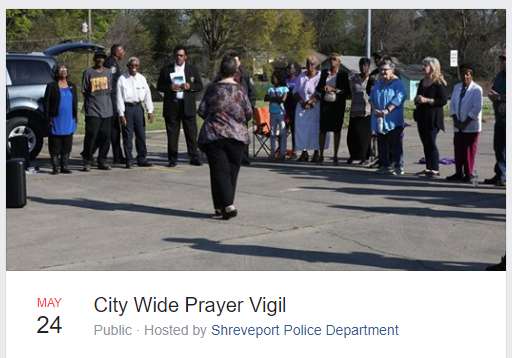 SHREVEPORT, La. — The Shreveport, Louisiana Police Department will no longer host community prayer vigils after receiving a complaint from one of the nation’s most conspicuous professing atheist organizations, which also identifies itself as a Church-State separation group.
SHREVEPORT, La. — The Shreveport, Louisiana Police Department will no longer host community prayer vigils after receiving a complaint from one of the nation’s most conspicuous professing atheist organizations, which also identifies itself as a Church-State separation group.
According to reports, the Wisconsin-based Freedom From Religion Foundation (FFRF) sent a letter to Shreveport Police Chief Alan Crump in August to assert that the prayer vigils are unconstitutional because they prefer “religion over non-religion” and run afoul of the First Amendment’s Establishment Clause.
According to the Shreveport Police Department Facebook page, the gatherings have been held since early 2017 and have been served as a means to combat violence in the city. Local television station KTBS reports that there have been 45 violent death in Shreveport in 2018.
“The Shreveport Police Department Pastors on Patrol invite the community to come together with police officers, police administration, and city leaders for a time of prayer for our city,” one event post reads. “There will be a time of praise and worship with the Airport Park Community Choir as well as a time of prayer for peace in our city.”
Crump’s bio also notes that Crump serves as the pastor of Republican Missionary Baptist Church, and has three degrees from the Inter-Baptist Theological Seminary.
However, FFRF told reporters that “[r]eligion and government do not mix,” and that when a police force promotes religion, “[i]t has a threatening feeling to those of us who are not Christian.”
“Citizens interact with and rely on law enforcement officers during some of the most urgent and vulnerable times of their lives,” the group wrote to Crump, according to the Shreveport Times. “As a police department, you serve a diverse population that consists not only of Christians, but also minority religious and nonreligious citizens. We hope you will agree that law enforcement must avoid any appearance of bias toward some citizens or hostility toward others.”
The organization also urged the police department to dissolve its chaplaincy program, contending, “A chaplain’s employment, even if volunteer, is an unconstitutional endorsement of religion.”
While the City does not plan to end its chaplaincy program, it did agree to discontinue holding the prayer vigils.
“We have to be inclusive of all of our citizens and representative of all of them. We want to make sure we’re implementing practices that do not alienate certain groups of people,” City attorney William Bradford told the Shreveport Times.
However, some have expressed objection to the move, and opine that America’s cities need prayer.
“As long tragedies continue to strike and tear our communities apart, there will be prayer vigils. Why shouldn’t law enforcement agencies get involved? If police are at the center of the healing process that occurs during prayer vigils, good for them! Eliminating cops from hosting these events by using the Establishment Clause as a legal foundation is wrong, and legally absurd,” wrote Jim McNeff for the site Law Enforcement Today.
The City of Shreveport will now depend on local citizens to organize their own prayer gatherings.
As previously reported, former U.S. Secretary of State Daniel Webster once exhorted—just 33 years after the writing of the Constitution, “[L]et us not forget the religious character of our origin. Our fathers were brought hither by their high veneration for the Christian religion. They journeyed by its light, and labored in its hope. They sought to incorporate its principles with the elements of their society, and to diffuse its influence through all their institutions, civil, political, or literary.”
“Let us cherish these sentiments, and extend this influence still more widely, in full conviction that this is the happiest society which partakes in the highest degree of the mild and peaceful spirit of Christianity.”
He also later declared in 1843, “If God and His word are not known and received, the devil and his works will gain the ascendancy. If the evangelical volume does not reach every hamlet, the pages of a corrupt and licentious literature will. If the power of the gospel is not felt throughout the length and breadth of the land, anarchy and misrule, degradation and misery, corruption and darkness will reign without mitigation or end.”
Become a Christian News Network Supporter...


